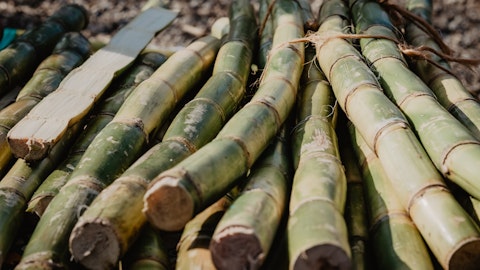Thiago Duarte: Great. Thank you, Luis.
Operator: Thanks. The next question is from André Vidal, sell-side analysts from XP. Please go ahead, André.
André Vidal: Hi, Luis, hi, Nelson [ph], hi, Lewin. Congratulations on all the changes, the results and the guide. I think that’s another stage — another step towards improving your disclosure to the market. I’d like to talk about move results, once again, great results, but we don’t have a lot of detail about that business. We don’t know what the details are that led to those results. So the increase in margin, was it driven by a specific region? Was it about synergies? Was it because of more macro results that affected the sector as a whole. Could you explain what led to this excellent results and how you see the future now looking at 2024, can we expect something similar to this third quarter or do you see any improvements taking place next year?
And as a follow-up question, I’d like to hear about Compass. Next year the terminal will go into operation and you have new supply to Comgas. So do you think there will be any room to keep the generic trading volumes as you did this semester?
Luis Henrique Guimarães: Thanks, Andre, for your questions. I’ll start with Move. So there was a combination of many elements there. Let me take a step back, move really set up a good management and operation system. It’s unique. It works very well across all geographies. All plants have surpassed their goals and have grown compared to last year. Europe is the smaller region, but the US did really well, especially when it comes to margin and capturing synergies and volume. We’re working hard on cleaning our portfolio, just like we did in Brazil to remove low-margin clients in adequate sectors going after quality, increasing our sales force. It is to be quite a small sales force to make sure that we are doing the right segmentation and going after the best opportunities in terms of profit, products, more synthetic products to pursue better margins.
So Brazil did really well in terms of volume and margin and Argentina as well. So again, we had the right business model with the distributors, our portfolio choices going from high volumes and low margins and concentrating our efforts and participating in semisynthetics and synthetics. And yes, you can expect growth again in EBITDA for next year. And again, great results across all geographies. We are still looking at other opportunities to increase our share in the US to increase scale and size in Europe. But obviously, those opportunities aren’t always available. So we’ll keep an eye out. And we’ll let you know if anything happens. About Comgas’ volume, yes. So that is a recurring result in marketing and services. That molecule will become more established when it comes to that model.
And yes, there is an opportunity for additional volumes. But again, that will depend on what happens in the market, price arbitration and the joint work we do with Total.
André Vidal: Great. Thank you.
Operator: Thanks. Next question is from Gabriel Barra, a sell-side analyst from Citi. Please go ahead, Gabriel.
Gabriel Barra: Hi. Thanks for answering my question. I would like to reiterate the congratulations. There are many names to mention, but you’ve done a fantastic job. My questions are more about Compass and a couple of topics I’d like to hear more about, please. First, the regas terminal, we’re coming close to commissioning time now. If you could update us on how that’s going, how can we — when can we expect the first cargoes and what’s the entry time line looking like? And about biogas, also, the company has made a couple of moves on biogas first with Horizon, then with Sao Martinho during the offtake for future production. So can we expect that to be a trend? Will Compass become a major off-taker of that biogas, given its potential in that sector here in Brazil, especially when it comes to sugar and ethanol because there’s a lot to be explored there.
So I’d like to understand a bit more about the future of that business. And as a follow-up question about the monetization of your contract with Total, could you explain how that monetization mechanism worked given that the regas terminal is not in operation yet. And it looks like it’s a small fraction of the hole. So if we consider monetization calculation and looking forward to results and the 12 million contract you have with Total, those are my three points. Thank you.
Luis Henrique Guimarães: Okay. I’ll start by the easiest one, which is the last one. So we took the molecule and sold it where the price was highest, given that the world has certain opportunities at certain times and being able to allocate that molecule at different times, in different geographies for different prices. So it was just about an arbitration between the price you’re buying it for according to your contract and the market price according to demand. And since all of Comgas supplies is guaranteed through contracts, it led to this opportunity. As for the biogas, it’s a very promising market, very important to the distribution sector for natural gas. The same has happened to gasoline and diesel, so ethanol and biodiesel to guarantee the longevity and their carbon footprint.
So it will do the same thing for natural gas, and Compass is exploring the different fronts. So landfill gas, sugar and ethanol gas and biogas coming from animal projects as well. Comet has operations in the South of Brazil, where that’s happening, too. So Compass, Comet and Comgas are major market developers, supporting producers, buyers, clients helping to regulate the market because it’s a free market, so it’s important that it can develop with flexible rules so as to foster increases in production. And there’s a huge potential for that. In Sao Paulo, Rio Grande do Sul, Santa Catarina, Mato Grosso do Sul, Parana, all the markets where we operate. So we see it very favorably. And that’s why the team created that concept at Compass, a company that we’ll be looking at this nonregulated business separately, so that we can focus on talents and resources.
And we are concluding the test cargo is ready to come to Brazil for the commissioning and that should happen at the beginning of next year. Once that’s done, all the licensing processes once the works are concluded, we’ll be ready to start operations next year.


